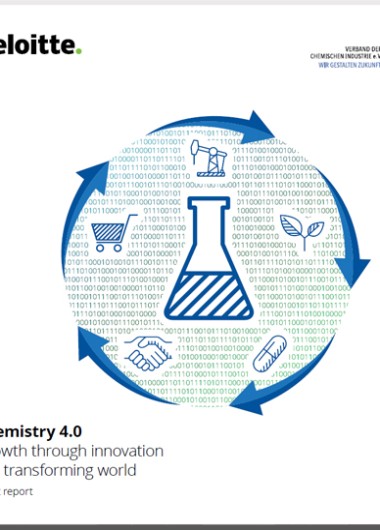The chemical and pharmaceutical industry in Germany is changing. Especially the factors digitalization, sustainability and circular economy play a decisive role. The study ‘Chemistry 4.0’ is examining this new development phase and shows which growth opportunities through innovations the chemical industry in Germany can implement in a world of change, which profound changes in companies are required for this and how associations and politicians can accompany this process. The short version of this study summarizes the main contents.
- Publication
- 29 Pages / DIN A4
- Target group
- Broad public, politicians, member companies, academia

Motivation and goal of the study
Due to change processes the chemical and pharmaceutical industry is faced with elementary strategic and structural challenges.
Changes in the societal environment
These challenges result on the one hand from an increasing importance of a sustainable economy and a sustainable consumption. On the other hand, digitalization in business and everyday life leads to major and rapid changes.
Competition in chemistry is intensifying
At the same time the whole competitive environment in the chemical industry is about to face a transformation by a further increase in competitive intensity.
Change processes in the chemical sector
As a result, the chemical industry in Germany is changing more strongly than in the past decades: In addition to continuous innovation and improvement processes, in the future the chemical industry will also be characterized by changes that have a very strong influence on product portfolios, value creation structures and business models.
The German chemical industry is in a new phase of development: the era of Chemistry 4.0, in which the topics digitalization, sustainability and circular economy play key roles.
Structure and method
The study is divided in three sections: environment analyses (development trends to 2030), detail analyses (core topics digitalization and circular economy) and recommendations for action for businesses and politicians.
Digital transformation of the chemical industry
The developments, which are summarized under the term digitalization, are not only a trigger for fundamental changes in the chemical environment but offer, at the same time, the possibility of successfully shaping the change in the chemical industry and, most importantly, of opening up new business and service areas.
The different starting points of digitalization can be split into three categories: transparency and digital processes, data-based operating models and digital business models.
Likewise, the importance of digital business models to the future viability of the German chemical industry has been recognized: over the next three to five years, chemical companies are planning to invest a total of more than a billion euros in digitalization projects and new digital business models.
The chemical industry’s key role in the circular economy
Circular economy contributes not only to the achievement of ecological goals, but also offers growth potentials to chemistry. In this study, the circular economy concept encompasses all contributions toward saving resources and includes the following measures: increasing resource efficiency, extending the lifespan of products and components, as well as reducing resource consumption and closing cycles as well as maximally efficient utilization of residual materials.
Mutual enhancement between digitalization and circular economy
The interplay of digitalization and circular economy concepts opens up special potentials. Digitalization in the chemical industry and the related technical possibilities contribute in a variety of ways to making circular business models possible in the first place and to improving their profitability, thus supporting the achievement of the UN sustainability goals.
Results of the survey of medium-sized companies
The analyses were supplemented by a broad survey of medium-sized chemical and pharmaceutical companies. This shows: the chemical and pharmaceutical mid-sized sector is already feeling that the digital revolution and the transformation into a circular economy bring significant changes. The relevance of the topics digitalization, sustainability and circular economy is also very clear.
Conclusions and recommendations
On the basis of the analyses, the study derives recommendations for businesses and politicians in order to successfully cope with the challenges associated with future changes.
Companies need to set new strategic goals, review business models, enhance resources, transform corporate culture, establish co-operations and platforms, or develop new concepts for participation.
However, the paradigm shift in the industry and its customer industries also needs support through industrial policy measures.
For the regulatory framework of digitalization applies: the public sector needs to expand technical infrastructure, support digital education, improve data security and review data protection rules. Cyber- and IT security needs to be one main focus of the German high-tech strategy.
For the framework conditions of the circular economy, the recommendations are: new and existing regulations should be placed under scrutiny in an ‘innovation check’, in particular regarding whether and to what extent they support or hamper innovations and enhancements and/or the development of new business models. To encourage more investments, state start-up funding for novel projects and facilitating access to venture capital and the promotion of private-public partnerships in the form of pilot projects are recommended. The policy should also raise public awareness for circular economy.
Wrap-up
The study shows that digitalization and circular economy are the causes of fundamental changes. The chemical industry should scrutinize its current portfolio of products and services and adjust its business models. Political decision makers are called upon to support these efforts with adequate industrial policy and to create globally competitive framework conditions for the chemical industry.
Structure and content of the short report:
- A new development in the chemical industry: the era of Chemistry 4.0
- Incremental innovations and disruptive changes in the chemical sector
- The digital transformation of the chemical industry
- The chemical industry’s key role in the circular economy
- Mutual enhancement between digitalization and circular economy
- Recommendations
More information
Contact
For questions or suggestions, please feel free to contact us.

Dr. Henrik Meincke
Abteilungsleitung Volkwirtschaft, Wirtschafts- und Industriepolitik
- E-mail: meincke@vci.de

Dipl.-Kfm. Johann-Peter Nickel
Geschäftsführung Wirtschaft, Finanzen, Digitalisierung, Geschäftsführung Chemie Wirtschaftsförderungs-GmbH, Künstlersozialversicherung
- E-mail: nickel@vci.de
